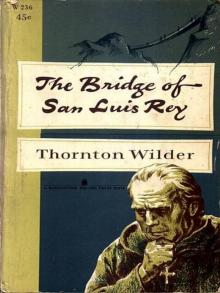- Home
- Thornton Wilder
The Ides of March Page 22
The Ides of March Read online
Page 22
LXVIII Inscriptions in Public Places.
[Cards bearing the following words were found attached to the statue of Junius Brutus, the Elder.)
Oh, that thou wert with us now, Brutus!
. . . . . . . . . . . . .
Oh, that Brutus were alive!
[The following were found propped against the chair reserved for Brutus as Praetor of the City.)
Brutus! Are you sleeping?
. . . . . . . . . . . . .
You are no Brutus!
LXVIII-A The Commonplace Book of Cornelius Nepos.
[From December forward Nepos entered all matters, even those dealing with early Roman history, in cypher.]
Fr. An agitated visit. He says that he has been approached by Longshanks [Trebonius? Decimus Brutus?]. It was impossible to discuss the basic madness of the project. I limited myself to giving him a sound drubbing and to turning the conspiracy to ridicule. I pointed out to him that there was not a name among the agitators that was not known to my wife and to her friends; that any conspiracy which sought his adherence was bound to fail, for he was known to be a man who could not hold his tongue; that his visit to me was evidence that he had not sufficient conviction in the aims of such an uprising to have any part in it; that he had nothing to contribute to it but his wealth and that a conspiracy that required wealth was a failure in advance, for money has never yet bought secrecy, courage, nor fidelity; that should this conspiracy succeed his fortune would be wiped out in five days; that there was little doubt that Caesar was in possession of the most detailed particulars and that we may expect to hear momently that the hotheads will be dragged from their homes and locked up in the caves under the Aventine Hill; and that the great man whom they are attempting to remove will probably not deign to execute them, but will send them to the shores of the Black Sea, where they can lie awake nights remembering the tumult of high noon on the Appian Way and the smell of roasting chestnuts on the steps of the Capitol. Yes, and the look on the face of the man they thought they could replace, as he mounts the steps to the platform and turns to address the guardians of Rome.
. . . . . . . . . . . . .
The City held its breath. The seventeenth [of February] has passed without event.
. . . . . . . . . . . . .
Every public event is now read in one light. The people are again paying the closest attention to the daily omens. Cicero is back in the City. He was seen to speak rudely to Longshanks and to pass the Blacksmith without greeting.
Since Caesar’s remarriage the Queen of Egypt is suddenly very popular. Odes to her are displayed in public places. Her departure has been announced, but deputations of the citizens present themselves at her door, urging her to prolong her visit.
. . . . . . . . . . . . .
The tide of rumors has abated. A new chief and a stricter discipline? The influx of veterans?
LXIX Caesar’s Journal—Letter to Lucius Mamilius Turrinus on the Island of Capri.
1023. By the immortal Gods, I am angry and I shall take pleasure in my anger.
The charge that I am the enemy of liberty was never brought against me while I commanded the armies of Rome, though, by Hercules, I so limited their movements that they could not walk a mile from their tents. They rose in the morning when I told them to and they lay down to sleep at my direction; and no one protested. The word freedom is in everyone’s mouth, though in the sense that it is being used no one has ever been free or ever will be free.
In the eyes of my enemies I sit clothed in the liberties which I have stolen from others. I am a tyrant and they liken me to the potentates and satraps of the East. They cannot say that I have robbed any man of money, of land, or of occupation. I have robbed them of liberty. I have not robbed them of their voice and their opinion. I am not oriental and have not kept the people in ignorance of what they should know, nor have I lied to them. The wits of Rome declare that the people are weary of the information with which I flood the country. Cicero calls me the Schoolmaster, but he has not charged me with distorting my lessons. They are not in the slavery of ignorance nor under the tyranny of deception. I have robbed them of their liberty.
But there is no liberty save in responsibility. That I cannot rob them of because they have not got it. I have never ceased from placing before them the opportunity to assume it, but as my predecessors learned before me, they know not where to grasp it. I rejoice at the extent to which the outposts of Gaul have shouldered the burdensome freedom which I have accorded them. It is Rome which has been corrupted. The Romans have become skilled in the subtle resources for avoiding the commitment and the price of political freedom. They have become parasites upon that freedom which I gladly exercise—my willingness to arrive at a decision and to sustain it—and which I am willing to share with every man who will assume its burden. I have been watching my Praetors [Cassius and Brutus]. They fulfill their duties with clerklike diligence; they mutter “freedom, freedom,” but not once have they raised their eyes and voices toward a greater Rome. On the contrary, they have laid before me sheaves of suggestions that would at the same time reinforce their little dignity and diminish Her greatness. Cassius wishes me to silence the enthusiasts who day by day in public places rail against me and our edicts. Brutus wishes to safeguard the purity of our Roman blood by limiting the right to citizenship. By the immersions of Castor and Pollux, his African doorman knows better than that. That is the refusal of freedom, for it is by taking a leap into the unknown that we know we are free. The unmistakable sign of those who have refused their freedom is envy; it is the jaundice of the eye that cannot rest until it has ascribed base motives to those who do not receive but who make their freedom.
But I have reminded myself that the mind is free and my anger has passed. The mind is easily wearied and easily frightened; but there is no limit to the pictures it makes; and toward those pictures we stumble. I have often remarked that whereas men say there is a limit beyond which a man may not run or swim, may not raise a tower or dig a pit, I have never heard it said that there is a limit to wisdom. The way is open to better poets than Homer and to better rulers than Caesar. No bounds have been conceived for crime and folly. In this also I rejoice and I call it a mystery. This also prevents me from reaching any summary conclusion concerning our human condition. Where there is an unknowable there is a promise.
LXX Caesar to Brutus: Memorandum.
[March 7.]
[In a secretary’s hand.]
The following dates are now established:
I shall leave on the seventeenth [for the Parthian War].
I shall return to Rome for three days on the twenty-second, should it appear advisable, to address the Senate on the electoral reform.
Billeting: the numbers [of recruits and veterans joining up] are exceeding my expectations. The eight temples [assigned to them for lodging, in addition to the facilities afforded by the barracks] may not be sufficient. Tomorrow we are moving from the Public House to the Palatine. The Public House should contain at least two hundred.
[Caesar continues in his own hand.]
Calpurnia and I hope that you and Porcia will dine with us, on the Hill, on the afternoon of the fifteenth, for my leave-taking. We are asking Cicero, the two Marcuses [Antony and Lepidus], Cassius, Decimus, Trebonius, and their wives, that have them. The Queen of Egypt will be with us after dinner.
So great is the pleasure that I take in your company, and in that of Porcia, that I could wish that you alone were our guests at that time. Since there will be others present, let me avail myself of this opportunity to lay upon you an injunction justified by our long friendship and by the kind offers of service which you have frequently made to me.
The separation from my dear wife will be hard for me; it will be hard for her. I shall rejoin her for a short time next autumn in Dalmatia or—without public notice—at Capri. In the meantime, I could know no greater consolation than to be assured that you and Porcia were holding her in your loves. To Porcia she has been bound by a clo
se friendship since childhood; to you she bears the esteem which your character and your loyalty to me deserve. There is no second home that she could frequent with more profit and none to which my thoughts would more frequently have preceded her.
LXX-A Brutus to Caesar.
[March 8.]
[The following is the unfinished draft of a letter which was not sent.]
I have taken note of the arrangements you have reported to me.
It is with regret that I must say that I shall not be able to be among your guests on the fifteenth. It has more and more become my practice to devote to study the few hours remaining to me at the close of the day.
I shall indeed, during your absence, seek to be useful to Calpurnia Piso in every way that I can. I think it well, however, that you consign her to the particular attention of others than myself, more active in the social life and less preoccupied by public business.
Your letter speaks, great Caesar, of my loyalty to you. I am glad you have done so, for it makes clear to me that you accord to loyalty the same meaning that I do. You will not have forgotten that I took up arms against you and received your pardon and that you have permitted me on many occasions to express opinions contrary to your own. From this I assume that you accept the loyalty of those who are first loyal to themselves and that you recognize that such loyalties may often come into conflict.
Your letter speaks, great Caesar, of my loyalty to you. That you have done so is——
It is with regret that I must reply to you that my wife’s ill-health will prevent our——
. . . before your departure, to express a measure of the gratitude I bear to you. That indebtedness I cannot repay. Since earliest childhood I have received——
I have taken note of the arrangements you have reported to me.
INGRATITUDE BASEST OF ALL THOUGHTS AND AC
[The following phrases are in early Latin. They appear to be an oath used in courts of law.]
“Oh, Jupiter, unseen and all-seeing, who readest the hearts of men, witness now that what I declare is true, and if there be any fault in it, may . . .”
Three yards of wool, medium weight, finished in the manner of Corinth; one stylus, trimmed fine; three broad lamp wicks.
My wife and I shall, indeed, with pleasure, that so great an oak, not forgetting him on whom shall rest the last glance of those great eyes, not without surprise and never to be forgotten so.
LXX-B Brutus to Caesar.
[As sent.]
I have taken note of the arrangements you have reported to me.
Porcia and I shall come to you with pleasure on the fifteenth.
Rest assured, great Caesar, that for her own sake and for yours, we love Calpurnia no less than ourselves and that we shall not be happy until she looks upon our home as her own.
LXXI Caesar’s Journal—Letter to Lucius Mamilius Turrinus on the Island of Capri.
1023. I have been remiss in writing to you. The days have been filled with preparations for my departure.
I am impatient to be off. My absence will constitute no inconsiderable gift to the City which is as harassed as I am by the continual rumors of sedition. It is ironical, is it not, that in my absence these men are powerless to alter the government and that when I have passed the Caspian Sea they have no choice but to return to their proper duties.
Their number appears to include some fifty members of the Senate, many of them holding the highest positions in the City. I have given that fact the grave consideration it deserves and I remain unshaken.
The Athenians passed a vote of censure on Pericles. Aristides and Themistocles were driven by them into exile.
In the meantime, I guard myself, within reason, and I continue my occupations.
My son [i.e., his nephew Octavius, formally adopted in his will which was written in September but not yet made public] returns to Rome soon after my departure. He is an excellent young man. I particularly rejoice that he has written me of his high regard for Calpurnia. I have told her that he will afford her the companionship of an older brother, nay, of an uncle. Octavius traversed his youth in a year and is now well advanced into his middle age. His letters are not less sententious than those in The Correspondence of Telemachus [a “model letter writer” widely used in schools].
The great Queen of Egypt is returning to her country, having learned more about us than many who have spent a lifetime here. To what uses she will put that knowledge, to what uses she will put her ever-astonishing self it would be hard to say. There is a gulf between men and animals; I have always thought it to be narrower than many suppose. She possesses the rarest endowments of the animal and the rarest endowments of the human being; but of that quality that separates us from the swiftest horse, the proudest lion, and the shrewdest serpent she has no inkling: she knows not what to do with what she has. Too wise to be gratified by vanity; too strong to be content with ruling; too large for wife. With one greatness she is in perfect harmony and on that score I did her a great injustice. I should have permitted her to bring her children here. She does not know it yet to the full; she is that figure which all countries have elevated to the highest honor and awe: she is the mother as goddess. Hence those wonderful traits that I was so long in explaining to myself—her lack of malice, and her lack of that fretful unease to which we are so wearisomely accustomed in beautiful women.
I bring my precious Calpurnia to you next autumn.
LXXII Calpurnia to her sister Lucia.
[March 15.]
Each day, before this departure, grows more precious. I am ashamed that I had not realized before more clearly the fortitude that is required of a soldier’s wife.
Yesterday afternoon we dined with Lepidus and Sextilia. Cicero was there and the company was very merry. Later my husband said he had never felt such friendship for Cicero, or from him; and this in spite of the fact that they baited one another with such sharpness that Lepidus did not know where to rest his eyes. My husband gave an account of the revolution of Catiline as though it had been a rebellion of mice against a worried cat called Cicero. He rose from the table and darted about the room peering into the wrong corners. Sextilia was laughing so that she got a stitch in her side. I find a new husband every day.
We came away early and before dark. My husband asked if I would let him show me some places that he loved. I was anxious to be off the streets, as you may well imagine, but I have learned not to urge caution on him. I know that he is well aware of the danger and chooses these risks in all consciousness. He walked beside my litter, followed by a few guards. I called his attention to an enormous Ethiopian who seemed also to be following us. He explained that he had once promised the Queen of Egypt that he would never object to the presence of this attendant who has since appeared and disappeared mysteriously, sometimes standing all night before our house and sometimes following him about for three days at a time. He is, indeed, a terrifying figure, but my husband appears to be very fond of him and was continually addressing remarks to him.
The high wind was rising that was soon to turn to storm. We went down the hill and into the Forum, stopping, dear Lucia, at this and that while he recalled a moment in history and in his own life. How he rests his hands on what he loves and how he gazes into my eyes to make sure that I am sharing his memory! We went into little dark streets and he put his hand against the house where he had lived for ten years as a young man. We stood at the foot of the Capitol. Even when the storm broke and the passersby fled by us like leaves, he would not hasten his steps. He made me drink from the spring of Rhea [reputed to insure fecundity]. How is it that I can be the happiest of women, and yet so filled with foreboding?
Our little trip was all unwise. We both passed a most disturbed night. I dreamed that the pediment of the house had been lifted in the storm and dashed upon the pavement. I awoke to find him groaning beside me. He awoke and flung his arms about me and I could feel the loud beating of his heart.
Oh, may the Immortal Gods watch over us.
>
This morning he is not well. He was fully dressed and ready to set out for the Senate when he changed his mind. He returned to his desk for a moment and has fallen asleep there, which his secretaries tell me has never happened before.
Now he has awakened and gone off, after all. I must hurry and prepare for the guests this evening. I am ashamed of this letter, so womanish.
* * *
Suetonius: The Lives of the Caesars: Book One.
[Probably written some seventy-five years later.]
When he sat down, the conspirators thronged about him and Tillius Cimber, who had put himself at the head of them, came close to him as though he were about to ask a question. When Caesar with a gesture tried to hold him at a distance, Cimber seized hold of his toga at both shoulders. As Caesar exclaimed: “Then this is violence!” one of the Cascas, standing at his side, plunged a dagger into him, just below the throat. Caesar caught hold of Casca’s arm and ran his pen through it; but as he tried to rise to his feet he was held down by another stab. When he saw that he was surrounded on all sides by drawn daggers, he wrapped his head in his robe at the same time drawing its folds about his feet with his left hand so that when he fell the lower part of his body would be decorously covered.
In this manner then he was stabbed twenty-three times. He said no word, merely groaned at the first stroke, though certain writers have said that when Marcus Brutus fell upon him he said in Greek, “You, too, my son!”
All the conspirators took themselves off and left him lying there dead for some time. Finally three common slaves put him on a litter and carried him home, one arm hanging down over the side.
Antistius the physician said that of all those wounds only the second one in the breast would have proved fatal.
* * *
Afterword
THORNTON Wilder was never able to write in the family house he built in 1930 outside New Haven, Connecticut, from royalties received for The Bridge of San Luis Rey. As he liked to put it, he had “to escape to write.” And what glorious escapes they were. Students of Wilder’s creative habits can feast on many a transatlantic crossing (“Baby does best on boats,” he was fond of saying), as well as stays in hotels and inns in Europe, the United States, and Canada, or at artists’ watering holes such as the MacDowell Colony in Peterborough, New Hampshire, and Mabel Dodge Luhan’s ranch in Taos, New Mexico.

 The Collected Short Plays of Thornton Wilder, Volume II
The Collected Short Plays of Thornton Wilder, Volume II Penelope Niven
Penelope Niven The Selected Letters of Thornton Wilder
The Selected Letters of Thornton Wilder The Bridge of San Luis Rey
The Bridge of San Luis Rey Theophilus North
Theophilus North The Woman of Andros / the Ides of March
The Woman of Andros / the Ides of March The Eighth Day
The Eighth Day The Ides of March
The Ides of March The Skin of Our Teeth
The Skin of Our Teeth The Woman of Andros and The Ides of March
The Woman of Andros and The Ides of March